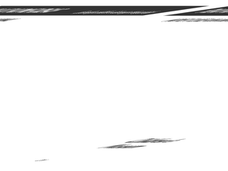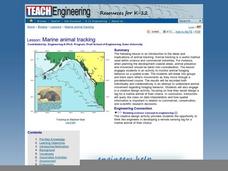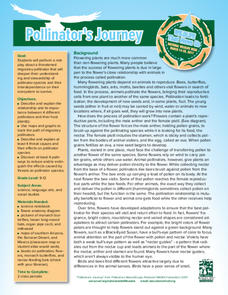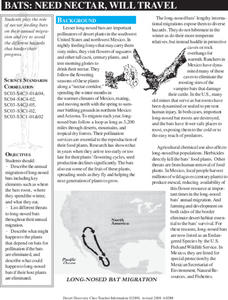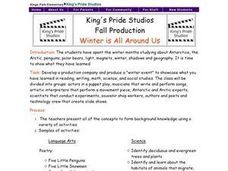Prince William Network
Migration Headache
During this game, kids become migratory shorebirds and fly among wintering, nesting, and stopover habitats. If they do not arrive at a suitable habitat on time, they do not survive. Catastrophic events are periodically introduced that...
Prince William Network
The Incredible Journey
Divide your school gym into breeding grounds and non-breeding grounds so that your zoologists can play a game simulating the seasonal migration of shorebirds. Players pick one of the included game cards and follow its directions, which...
Curated OER
Animal Movements
Students discuss the behavior of different animals and how they move. They explore the ways that this helps them live and find food in their environment. They participate in a game that requires them to mimic the ways in which animals move.
Curated OER
Walk Like Animals
There's nothing like a good movement activity for young learners. In this one, everyone pretends to be a certain kind of animal and moves in a way that the animal really does. First, a brainstorm session is held where the kids name the...
Curated OER
Move it Like An Animal
Students investigate how animals move. In this animals lesson, students use pictures of animals and demonstrate how each of them moves from place to place.
Curated OER
Can You Do It? I Can Do It!
Students explore animal movements. They listen to the book, 'From Head to Toe,' discuss the animal movements, and imitate the animal actions during a rereading of the story.
Curated OER
Marine Animal Tracking
Students engage in a lesson which serves as an introduction to the ideas and implications of animal tracking. They monitor animal foraging behavior on a spatial scale. The students break into groups and track each other's movements as...
National Wildlife Federation
Fish and Ladders: Grades 9-12
Swim with the big fish. Using a similar simulation as Fish and Ladders: Grade 5-8, pupils model the migration of Chinook salmon. A large group of the learners play the role of fish, while others are fishers, predators, and hazards....
National Wildlife Federation
Pollinator's Journey: Grades 5-8
Re-enact the flight of the pollinator. Pupils learn about the roles of butterflies, bats, and other pollinators in plant reproduction. The class acts out the migratory flight of Monarch butterflies and bats from the Sonoran Desert to...
National Wildlife Federation
Pollinator's Journey: Grades 9-12
Gain a deeper understanding of migratory pollinators. After studying about pollinators and their effects on flowering plants, learners hear a story about the migration of Monarch butterflies and bats in the Sonoma Desert. Small groups...
Curated OER
Bats: Need Nectar, Will Travel
Beginning wildlife biologists become adult bats, baby bats, snakes, owls, bobcats, or land-clearing developers in a grand role-playing activity. In a large open space, they play a game in which they move to designated areas based on what...
Curated OER
Ocean Exploration
Young scholars explore whales. In this animal adaptation and whale lesson, students access prior knowledge about whales from previous lessons, then use background knowledge to predict the eating strategies of a baleen whale and a toothed...
Curated OER
Migration
Students study reasons for and examples of bird migration as a behavioral adaptation. They investigate the Bernoulli's Principles.
Curated OER
Population Game
Learners assess the carrying capacity of the land. For this animal population lesson, students participate in a role-playing scenario to discover the factors affecting animal populations.
Curated OER
Do the Locomotion with Me
Fourth graders listen to a reading of In the Snow Who's Been Here? They experiment with making tracks by painting the bottom of their shoes and making tracks using different forms of locomotion. They apply what they know to winter...
California Academy of Science
Coincidental Colonization
The Galápagos Islands are an amazing place of isolated adaptation, colonized by an interesting mix of plants and animals. The class plays a game to help them understand how these organisms came to live on the island through a combination...
Curated OER
On the Road Again
Students trace the migration route of a gray whale. They color and label a map of North America, and using photocopy pictures of a gray whale, they move the whale along the migration route over a ten week period.
Curated OER
Why Do Geese Fly South For the Winter?
Fifth graders examine migration by tracing animal migration routes on a map. In this animal life lesson, 5th graders observe a map of North America and read about the migration patterns of geese. Students trace the path most...
Curated OER
Week 7: Animal Adaptations - Bird Beaks
Young scholars use tools to represent bird beaks and pick up different types of food with them in order to discover which beak would help the bird survive depending on their food type.
Curated OER
Seeing and Hearing Game
Students study the animal senses. In this animal senses instructional activity, students act out animal movements and make animal sounds. They use "see and hear" cards to play a game in which they find another child with a either "make a...
Curated OER
ProjectWILD Aquatic: Migration Headache
Students explore the important factors that affect habitat quality and the associated survival of migratory water bird populations. They discuss an organisms dependency upon a variety of habitats and habitat quality. Students play a game...
Curated OER
Human Evolution
Students investigate hominid evolution to learn the difference between a relative and an ancestor. They study the emergence of bipedalism and the related physical adaptations and cultural ramifications, and chart patterns of hominid...
Curated OER
Structural and Behavioral Adaptations
Students participate in a role playing lab that allows students to experience how different beak adaptations play a role in the type of food the animal can eat, therefore playing a role in the survival of the species.
Curated OER
Winter is All Around Us
Students present what they have learned on Antartica. Students identify deciduous and evergreen trees and plants; identify and study about the habitats of animals that migrate, hibernate, and adapt; study the Aurora and Aurora Borealis...




